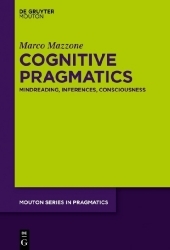
Cognitive Pragmatics
Mindreading, Inferences, Consciousness
Sorozatcím: Mouton Series in Pragmatics [MSP]; 20;
-
5% KEDVEZMÉNY?
- A kedvezmény csak az 'Értesítés a kedvenc témákról' hírlevelünk címzettjeinek rendeléseire érvényes.
- Kiadói listaár EUR 139.95
-
59 072 Ft (56 259 Ft + 5% áfa)
Az ár azért becsült, mert a rendelés pillanatában nem lehet pontosan tudni, hogy a beérkezéskor milyen lesz a forint árfolyama az adott termék eredeti devizájához képest. Ha a forint romlana, kissé többet, ha javulna, kissé kevesebbet kell majd fizetnie.
- Kedvezmény(ek) 5% (cc. 2 954 Ft off)
- Kedvezményes ár 56 118 Ft (53 446 Ft + 5% áfa)
Iratkozzon fel most és részesüljön kedvezőbb árainkból!
Feliratkozom
59 072 Ft

Beszerezhetőség
Megrendelésre a kiadó utánnyomja a könyvet. Rendelhető, de a szokásosnál kicsit lassabban érkezik meg.
Why don't you give exact delivery time?
A beszerzés időigényét az eddigi tapasztalatokra alapozva adjuk meg. Azért becsült, mert a terméket külföldről hozzuk be, így a kiadó kiszolgálásának pillanatnyi gyorsaságától is függ. A megadottnál gyorsabb és lassabb szállítás is elképzelhető, de mindent megteszünk, hogy Ön a lehető leghamarabb jusson hozzá a termékhez.
A termék adatai:
- Kiadás sorszáma 1
- Kiadó De Gruyter Mouton
- Megjelenés dátuma 2018. január 22.
- ISBN 9781501516122
- Kötéstípus Keménykötés
- Terjedelem197 oldal
- Méret 230x155 mm
- Súly 416 g
- Nyelv angol 0
Kategóriák
Rövid leírás:
Mouton Series in Pragmatics (MSP) is a timely response to the growing demand for innovative and authoritative monographs and edited volumes from all angles of pragmatics. Recent theoretical work on the semantics/pragmatics interface, applications of evolutionary biology to the study of language, and empirical work within cognitive and developmental psychology and intercultural communication has directed attention to issues that warrant reexamination, as well as revision of some of the central tenets and claims of the field of pragmatics. The series welcomes proposals that reflect this endeavour and exploration within the discipline and neighboring fields such as language philosophy, communication, information science, sociolinguistics, second language acquisition and cognitive science. MSP will provide a forum for authors who represent different subfields of pragmatics including the linguistic, cognitive, social, and intercultural paradigms, and have important and intriguing ideas and research findings to share with scholars who are interested in linguistics in general and pragmatics in particular.
TöbbHosszú leírás:
Cognitive pragmatics is a mature field of research, characterized by robust theories and a growing amount of experimental work. In particular, Relevance Theory has provided a rich framework for research in the field. However, this theory makes a number of assumptions that are rooted in a modular view of cognition. This book provides a detailed analysis of such assumptions, arguing for an alternative model which has, however, some support in ideas explored by relevance theorists. First of all, inferences are explained in terms of associative pattern completion within associative networks, based on the schematic organization of memory. This explanation is shown to apply to a number of cognitive domains besides pragmatics, including mindreading. Moreover, such a view is compatible with a general understanding of the neurocomputational machinery of our cortex, suggesting a general argument to the effect that modularity in its standard version cannot be right. Second, the book argues for a crucial role of conscious attention in pragmatics as well as in most cognitive processes. In the end, what is proposed is not only a revision of Relevance Theory but also a fresh analysis of reasoning, which vindicates some Gricean intuitions.
"Indeed, I cannot emphasise enough that the merits of the monograph under review go far beyond its most immediate aim of revising RT. While drawing on an impressive array of literature that spans philosophy, psychology, neuroscience and linguistics, Mazzone masterfully navigates his way through a minefield of potential terminological pitfalls and still manages to present in as much an unambiguous and detailed way as possible a solidly motivated and very well informed single-level associative approach to pragmatic processing. And all this is done in a way that does not only make complex and often highly abstract ideas easy to follow, but also genuinely encourages the reader to reevaluate assumptions that are often taken for granted in the relevant literature. There is no two ways about it, Cognitive Pragmatics: Mindreading, Inferences, Consciousness is pragmatics theorizing at its finest."
Stavros Assimakopoulos in: Journal of Pragmatics 143 (2019), 7-9




